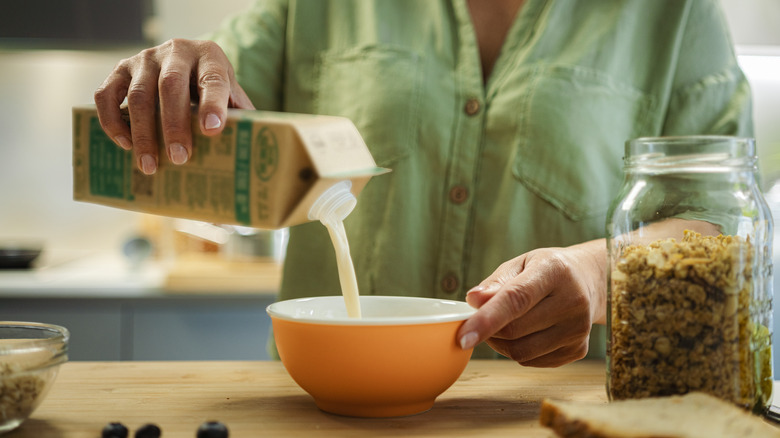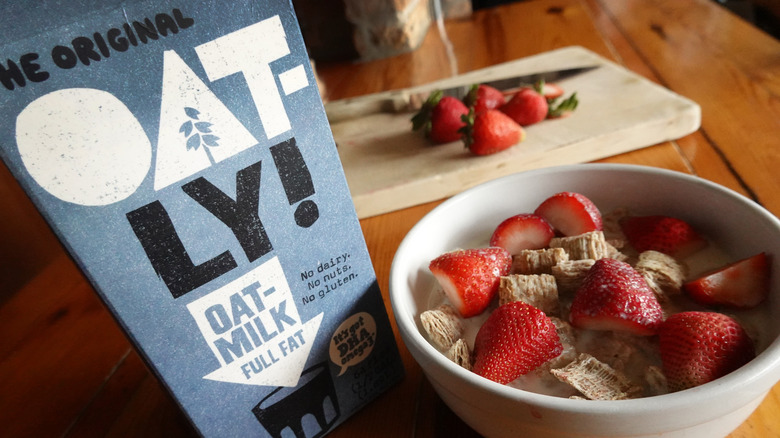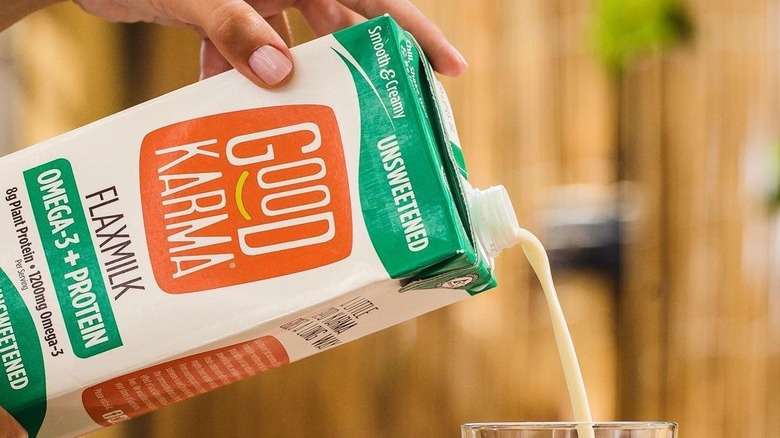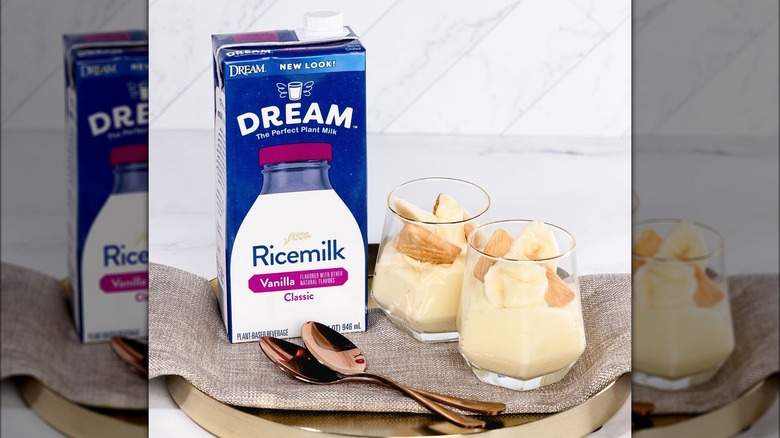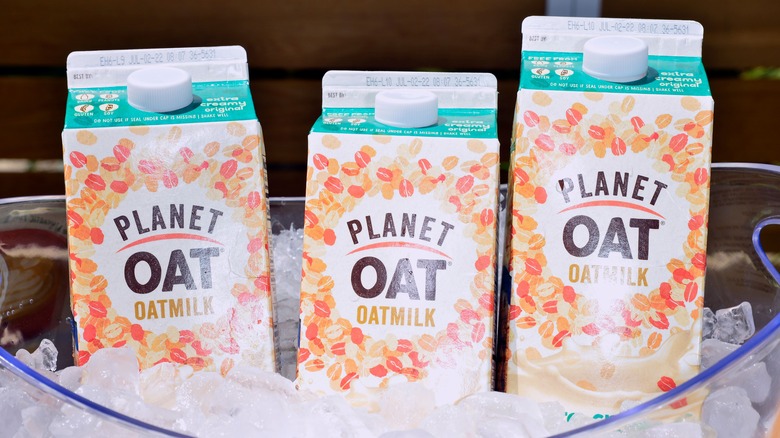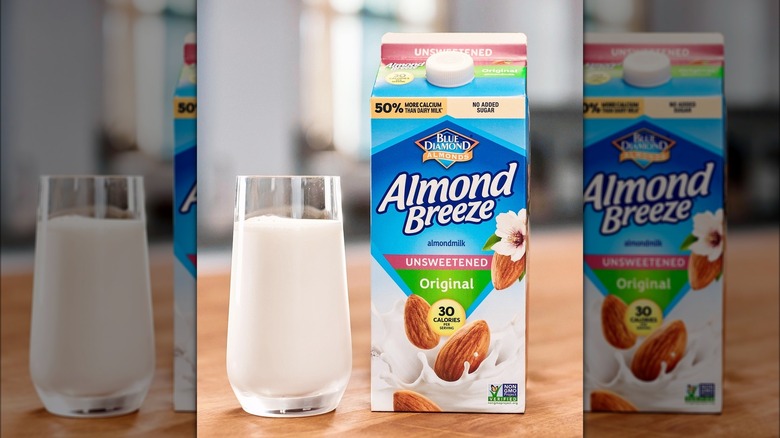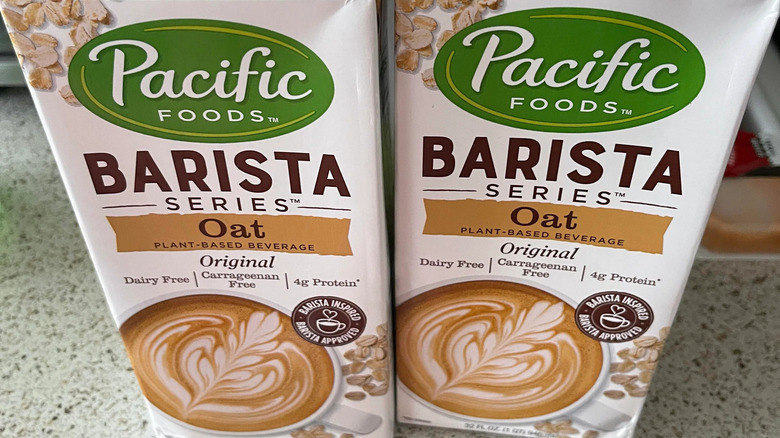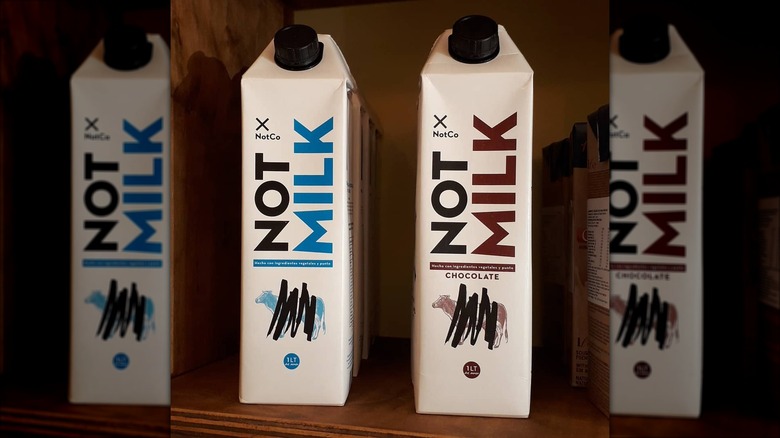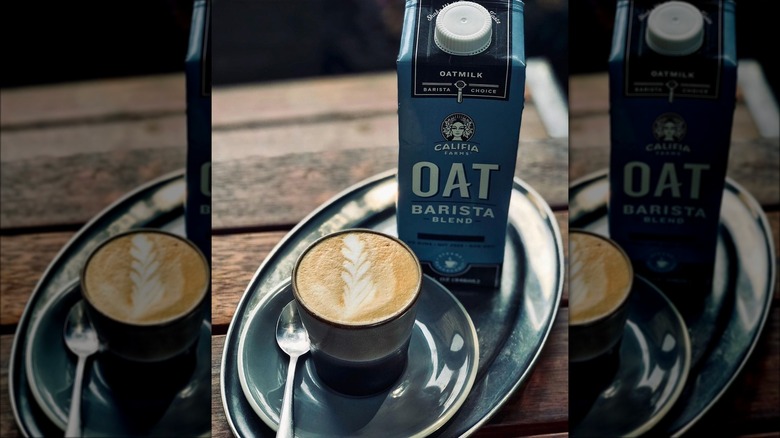8 Non-Dairy Milk Brands You Should Think Twice About Buying
Gone are the days when your only option for non-dairy milk consisted of the same boxed soy milk on your local grocery store's designated and oftentimes dusty plant-based corner. We officially live in the golden age of non-dairy alternatives. That means hundreds of brands are vying to win the appetites (and wallets) of the vegans, lactose-free, and those who just can't stomach the idea of sipping cow's milk.
However, not all milk alternatives are equal. For the 44% of Americans who are currently opting to go dairy-free, choosing between almond and oat or hemp and coconut is hard enough without deciding which brand to purchase. Some offer more nutritional perks — rivaling or even outdoing the calcium or protein provided by dairy milk, as soy milk can do — while others may be stronger on taste but weaker on the environmental or ethical front that may have driven some to go dairy-free in the first place. A common issue with dairy-free milk tends to be its sugar level, with some brands using the ingredient to sweeten away unwanted aftertastes or make a beverage closer in flavor to dairy milk.
To make finding your go-to milk substitute easier, we've rounded up eight dairy-free brands you may want to skip on your next visit to the grocery store.
1. Oatly
Rewind to 2020 and Oatly was at the top of the dairy-free milk game. The oat milk brand surged in popularity during COVID-19 lockdowns, with sales reportedly increasing by 295% worldwide. "Milk" and "cool" rarely go in the same sentence, but while the rest of the world was seemingly falling apart, Oatly transformed into a COVID status symbol, becoming as ubiquitous as Hydroflasks and sourdough starters.
Oatly is still well-loved by both the dairy-free and those who dip into the lifestyle as they please, all for one very important reason: it tastes good. However, some have turned their back on the brand in recent years as scrutiny grows over its nutritional value and relatively high glycemic index. With sometimes 7 grams of added sugar per serving, it's been claimed that drinking one glass of Oatly has the same impact on your blood sugar as a can of Coca-Cola. And unless you opt for its low-fat version, a single glass is also said by some to contain as much canola oil as a serving of French fries.
While Oatly isn't too texturally different from dairy milk, its sweet aftertaste is pretty distinctive, making it divisive. But taste and ingredients aren't the only concerns. In the summer of 2020, the brand received a $200 million equity investment from Blackstone Growth, an investment firm linked to devastating deforestation in the Amazon Considering its sustainable marketing and messaging, this hasn't endeared Oatly to the eco-conscious masses, who've accused the brand of hypocrisy and greenwashing.
2. Good Karma
Good Karma is obsessed with all things it deems good. As the brand — which makes both oat and flax milk — says on its website, "Good quality plants make good quality products, which makes good quality humans." There are undeniably a lot of positives on each milk's nutritional label, with relatively high levels of calcium, protein, and omega-3 fatty acids compared to other plant-based milk varieties. However, all the positive percentages in the world don't make up for the fact that the flavor is, at least to many, a little offputting. Some have claimed that the unsweetened versions taste strangely savory and bitter.
Its milk also doesn't always mix well with other liquids, either, sometimes curdling or sinking to the bottom of the cup in an unsightly mess. Considering how most people purchase milk substitutes to use with coffee or tea, that's a pretty damning critique. Rumor has it that Good Karma representatives have advised customers to buy from its line of milk that's made without added protein to avoid this issue when making hot drinks. But in an ideal world, its star product would do everything it says on the tin without any such footnotes.
3. Dream
While it prefers to be known as Dream nowadays – and has branched out into the likes of oat, coconut, soy, and almond milk — this dairy-free milk brand is still perhaps best known to consumers as Rice Dream. After all, it was one of the founding figures of the dairy-free milk brands crew. Its staple variety is (you guessed it) ricemilk, which uses a straightforward combo of water, organic rice, organic canola or sunflower oil, and sea salt to create what the company has deemed to be "a delicious, refreshing flavor with a touch of sweetness."
Dream's ricemilk delivers on this promise of a touch of sweetness, managing to tread the fine line between too sour and too sweet (which has proven to be a surprisingly tough feat for plant-based milk). However, the taste of Dream's ricemilk is very distinctive and can unpleasantly stand out when mixed with other substances. This is totally fine if you don't mind a subtle rice flavor, but if you don't — or if you like a dairy-free substitute that tastes as close to dairy milk as possible — we recommend that you look elsewhere.
4. Planet Oat
If you thought there was just one type of oat milk, think again. Planet Oat boasts a lineup that currently features eight different varieties, from Barista Lovers Oatmilk to Unsweetened Vanilla Oatmilk. While it undoubtedly knows a lot about how to milk an oat's full potential, there has also been a lot of negative press concerning the health benefits of Planet Oat's offerings.
What concerns many in particular is Planet Oat's relatively low protein levels – it has an average of 2 grams or less per cup — and the use of unpopular additives such as dipotassium phosphate and fake vanilla gum. The latter also has an impact on the taste of some varieties of milk, causing it to taste extremely sweet to many palates. This admittedly may be a plus to some people, but trust us when we say it gets sickly if you're consuming Planet Oat regularly.
Another, more easily overlooked critique for some people is the actual aesthetic of the milk. You rarely describe your favorite beverage as thin and gray, but those are two terms often bestowed upon the brand by dissatisfied reviewers. While the Barista Lovers line (which, as the name suggests, is made especially for those looking to whip up coffee drinks like in their favorite cafe) tends to froth more than dairy milk, this is a common issue we've noticed across all varieties of Planet Oat.
5. Almond Breeze
If you recognize the packaging of one dairy-free milk, it's probably Almond Breeze. The Blue Diamond product first hit shelves in 1998, practically making it a dinosaur of the plant-based milk industry.
Taste-wise, it's hard to criticize Almond Breeze. It's subtle, creamy, and gets the job done in pretty much any situation. Instead, the brand's issues lie behind the scenes. Almond Breeze has been called out repeatedly for the additives used in its products despite proudly proclaiming itself sugar-free on each carton. Blue Diamond was also once sued over the low content of almonds (yes, the ingredient so important that it composes half the brand's name) in the milk. The lawsuit claimed almonds made up just 2% of the contents, with the other 98% was from fillers such as sugar, gum, and sunflower lecithin.
Plenty of people opt for Almond Breeze or other almond milk brands with the mindset that they're doing so for the sake of the planet. However, another harsh reality we have to mention is that almond milk takes even more water to produce than cow's milk. One study found that as much as 3.2 gallons of water is employed to grow and harvest one California almond. On the plus side, however, growing almond trees does lock up a lot of potentially harmful planet-warming carbon dioxide, so you may still consider that a silver lining.
6. Pacific Foods
As a sort of culinary Jack of all trades, Pacific Foods makes almond, cashew, coconut, hemp, oat, and soy milk. Inevitably, some of these are tastier than others (personally, our favorite is the brand's take on almond milk), but one that's best avoided is the oat milk, which some major reviewers have dubbed the worst on the market. Yikes.
Pacific Foods falls victim to what is surely the most common oat milk trap: it's just too sweet. In fact, it tastes so sugary that we'd go so far as to call it cloying. That's not just a taste difference either. Take a look at the label: a single serving of Pacific Foods Organic Oat Original Beverage contains a whopping 17 grams of sugar – which, for context, is the same amount as one serving of a Hershey's Milk Chocolate Bar. Reviewers have also noted that the beverage has an odd chalky texture that persists even when you mix your milk with tea or coffee.
A similar problem plagues the brand's other varieties, with some online reviewers claiming that the cashew milk boasts an unusual chemical taste and the coconut milk lacks any distinctive coconut flavor. Also, while calories definitely aren't everything when it comes to the broader idea of health foods, Pacific Foods' products do tend to rank poorly compared to other brands, with both its hemp milk and ultra soy milk carrying in a relatively hefty 140 calories per cup.
7. NotMilk
NotMilk is (surprise, surprise), not milk. The brand's products are designed to taste as close to cow milk as possible, but what truly separates it from the competition is that it doesn't advertise itself as oat milk, soy milk, or any specific kind of plant-based milk. NotMilk is entirely its own entity, made with water, sunflower oil, and pea protein in an effort to recreate the creamy flavor of milk derived from an actual cow.
Except, well, it doesn't. NotMilk has its fans, but for many, this milk doesn't taste at all like its cow-based counterpart. Its products use pineapple and cabbage juices as flavorings (yes, really), both of which customers have claimed to taste. As one unimpressed Reddit user put it: "You can't ignore the pineapple and all I can taste is cooked cabbage. I want rescuing from this flavor in my mouth but none is coming." Not exactly a glowing endorsement.
We'll vouch for NotMilk Chocolate, which we found to be significantly tastier than the unflavored milk — although it is admittedly easier to make something taste good when you mask it with chocolatey goodness. Regardless of which flavor you vouch for, though, it's worth noting that unless you purchase from the High Protein line, NotMilk's products contain significantly less protein than dairy milk.
8. Califia Farms
If we're just going by taste, Califia Farms is far from the worst dairy-free milk brand out there. The brand — which specializes in creative, indulgent flavors — boasts an impressive lineup of tasty options, including Toasted Coconut Almond Milk, Oat Barista Blend, and Cookie Butter Almond Creamer (not to mention a wide variety of seasonal creamers and other limited-time products).
While many are fans of the brand's flavors, Califia Farms manages something of a double miracle by making most of its products relatively low in sugar and fat. So, what lets it down? That would be the past controversy focused on its ingredient lists. In 2019, Califia Farms was sued for being dishonest about its use of fake vanilla in its almond milk, though the label on the product claimed that it contained the real deal. The brand was later ordered to pay out a total of $3 million to consumers who purchased any of these mislabeled products.
Vanilla (or faux vanilla, as the case may be) isn't the only issue Califia Farms has encountered. Some diehard dairy-free milk fans have also found fault with the texture of the company's products. While its milk certainly tastes creamy, it most definitely doesn't look or feel like it. This is most likely because the brand avoids the artificial thickener carrageenan (which is perhaps a point in its favor, as some have concerns over carrageenan's inflammatory effects), but it does make a noticeable difference if you're using it in your morning coffee.
